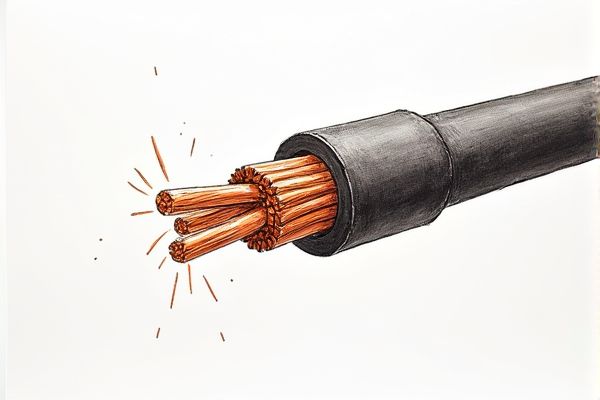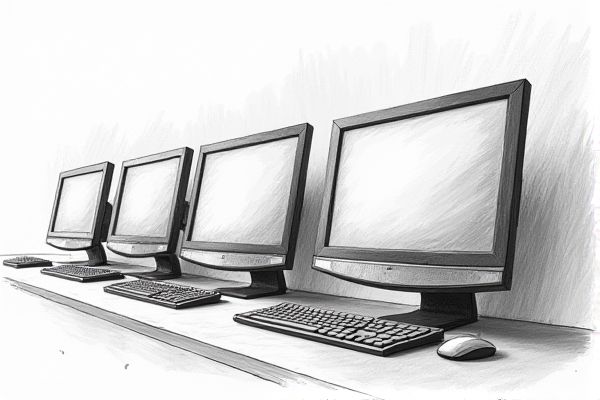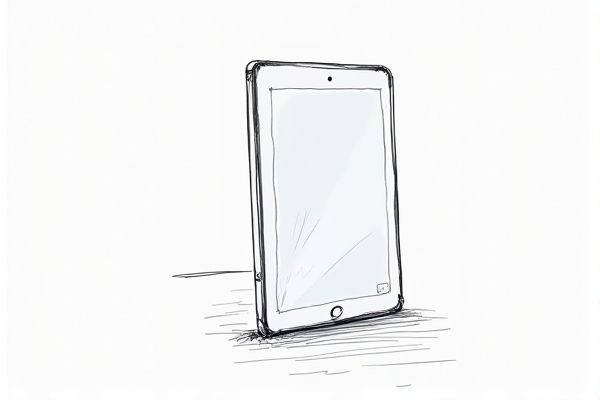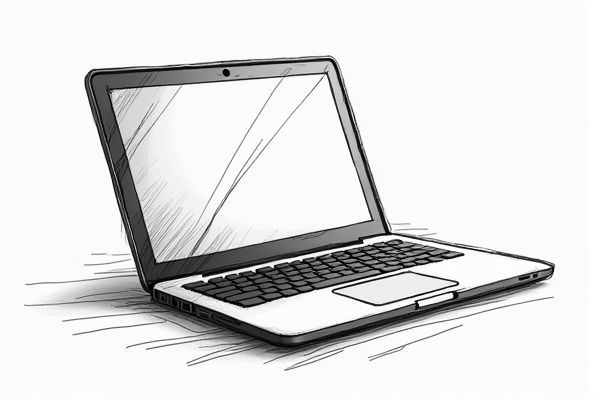In today's rapidly evolving tech landscape, choosing the right computer brand is more crucial than ever for both personal and professional users. With a myriad of options available, each brand boasts unique features, from cutting-edge technology to exceptional design and customer support. Popular brands like Apple, Dell, and Lenovo consistently impress with their innovation and reliability, catering to a wide range of needs and preferences. For a comprehensive overview and in-depth analysis of the top computer brands that stand out in the market, explore the list below.

Illustration of computer
Best brands of computer in 2025
Apple
Apple continues to excel as a leading producer in the computer market, with its Mac lineup driving significant growth. In Q2 2024, Apple's Mac shipments reached 5.5 million units, capturing a 9% market share and marking a 6% increase from the same period in 2023. This growth contributed to the global PC market's 3.4% year-on-year increase, with total shipments of 62.8 million units. Apple's strong performance is also reflected in its U.S. market share, where it held 16.1% of the personal computer market in Q4 2023. Apple's revenue from Mac computers in Q4 2024 was $7.7 billion. For a detailed analysis of how Apple's Mac continues to outpace the recovering computer market, visit Apple Insider.
Dell
Dell Technologies is a leading producer in the computer industry, boasting a significant market share. As of Q3 2024, Dell holds a 10.58% market share in the computer hardware industry and a 23.6% PC unit shipment share in the United States. The company's Dell Unity storage systems set a high standard for midrange storage with advanced features like scalability, efficiency, and multi-tenancy capabilities. Dell's global PC shipments amounted to 64.28 million units in 2023, with a worldwide shipment share of 17.3% and 17.4% in Q1 and Q2, respectively. Dell's products cater to a wide range of users, including both desktop and mobile users, with a total user share of 34.57% in the United States. For more details, visit their official website.
Lenovo
Lenovo continues to lead the global PC market, with a market share of 24.8% to 26.3% in the third quarter of 2024, according to data from Canalys and Statista. The company shipped 16.5 million PC units during this period, marking a 3% year-on-year increase. Lenovo's dominance is further solidified by its strong presence in both notebook and desktop markets, although notebook shipments saw the most significant growth. The company's overall revenue has also seen a notable increase, driven partly by a 65% jump in its infrastructure solutions group. Lenovo's strategic focus on gaining market share, particularly in cloud and data center infrastructure, positions it for future growth. For more insights, visit their official news page.
HP
HP (Hewlett-Packard) is a leading producer of computers, having held the position of the world's leading PC manufacturer from 2007 to 2013. As of 2022, HP maintained a significant market share of 19.4% in global PC shipments, and in the U.S. market, HP edged out Dell in the second quarter of 2023 with a 26.5% market share, shipping 4.83 million units. HP's revenue from its Personal Systems segment was $43.4 billion in 2021, and the company has consistently increased its market share since 2012. HP also dominates the hardcopy peripherals market and has a strong presence in the enterprise and consumer sectors. With a rich history dating back to its founding in 1939, HP continues to innovate and deliver high-quality computing solutions. For more detailed insights, you can visit the HP statistics page.
ASUS
ASUS is a leading brand in the computer industry, renowned for its innovative and robust products. In 2016, ASUS and its ROG series held a 40% global market share in gaming laptops, outperforming the next three competitors combined. As of 2023, ASUS maintained a 6.5% global market share in PC unit shipments and shipped 20.7 million PCs globally, showcasing a significant market presence. The company is also recognized for its durability, with ASUS notebooks performing flawlessly in extreme conditions such as space and high-altitude expeditions. In the third quarter of 2024, ASUS held a market share of 7.9% in global PC unit shipments, solidifying its position among top PC vendors. For more information on ASUS's remarkable achievements, visit their history page.
Acer
Acer is a leading global technology company, renowned for its robust performance in the competitive electronics market. In 2023, Acer held a 6.6% share in the global PC market, with Lenovo leading at 24.8%. Acer's revenue in 2023 was approximately $10.5 billion US dollars, with a projected growth to $11.2 billion in 2024, driven by its strong presence in the laptop and Chromebook segments. The company shipped 86 million PC units in 2023 and maintains a significant market share in the education sector, particularly with its Chromebook offerings. As of Q3 2024, Acer's market share in the global PC market increased to 7.3%. For more detailed insights, check their Acer statistics.
Microsoft
Microsoft is one of the leading producers of computer software and operating systems, commanding a dominant 73% market share in the desktop and laptop market as of 2024. Its Windows operating system is the most widely used, with over 68% of the global market share. Microsoft's brand value has surged to $611 billion in 2022, a 49% increase from the previous year. The company's revenue has consistently grown, with an 18% year-on-year increase between 2021 and 2022, reaching $198.27 billion in 2022. Microsoft's market cap stands at $2.254 trillion as of April 2023, reflecting its industry dominance. Explore more about Microsoft's rise by visiting this comprehensive collection of Microsoft statistics.
Razer
Razer is a leading brand in the gaming industry, known for its high-end precision gaming products. With a market share of 12.83% in the global PC Gaming Peripherals market, Razer stands out for its commitment to innovation, ergonomics, and expert validation. The company's revenue increased by 33.3% year-over-year to $1.62 billion, and its net profit rose significantly from $800,000 in 2020 to $43.3 million. Razer holds 1,817 patents worldwide, with 1,232 already granted, and its products are popular among gamers, with Razer Gold having 30 million registered users as of June 30, 2021. Razer's focus on cutting-edge technology and user-friendly design has solidified its position as a premium brand.
MSI
MSI (Micro-Star International) is a notable player in the computer market, particularly known for its high-performance gaming laptops and desktops. While not among the top five in global market share, MSI, along with other brands like Toshiba, Microsoft, and Samsung, collectively accounts for around 13.9% of the global laptop market share as of 2023, though this has declined by 2.3% from 2022. MSI's products are highly regarded in the gaming community, with series like the GS and GT series offering advanced features and powerful hardware. Despite its niche focus, MSI's influence in the Asia-Pacific region is significant. However, its presence in the US market is less prominent compared to other major brands. For more information, visit MSI's official website.
LG
LG Electronics, although not a leading producer of computers, is a significant player in the consumer electronics and home appliances market. LG has maintained a strong presence in the TV market with over a 15% global market share and generates substantial revenue from its Home Appliance & Air Solution segment, which earned around $23 billion in 2023. However, LG exited the smartphone market in April 2021 to focus on other areas. The company faces stiff competition from tech giants like Apple, Sony, and Samsung Electronics. Despite this, LG remains committed to innovation and product development to stay ahead. For more insights on LG's market presence, visit this LG Electronics overview.
















Leave a Reply
Your email address will not be published.